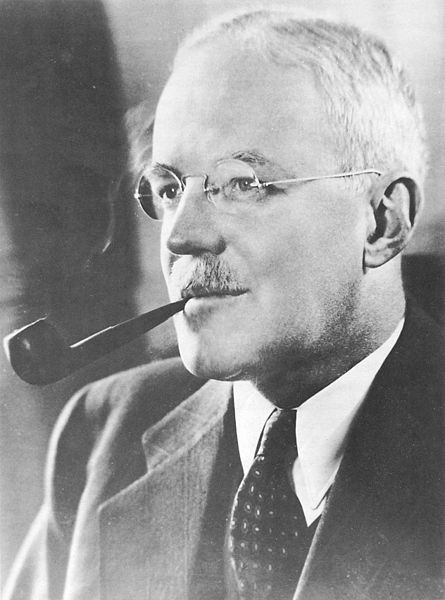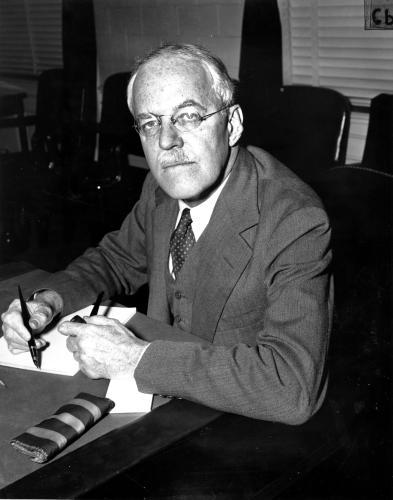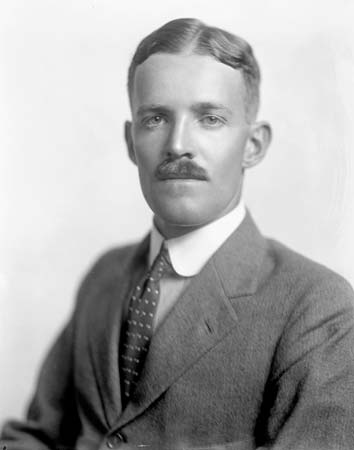<Back to Index>
- 5th Director of Central Intelligence Allen Welsh Dulles, 1893
PAGE SPONSOR



Allen Welsh Dulles (April 7, 1893 – January 29, 1969) was an American diplomat, lawyer, banker, and public official who became the first civilian and the longest serving (1953 – 1961) Director of Central Intelligence (de facto head of the U.S. Central Intelligence Agency) and a member of the Warren Commission. Between stints of government service, Dulles was a corporate lawyer and partner at Sullivan & Cromwell. His older brother, John Foster Dulles, was the Secretary of State during the Eisenhower Administration.
Allen Dulles was born on April 7, 1893, in Watertown, New York, and grew up in a family where public service was valued and world affairs were a common topic of discussion. Dulles was one of five children born to Presbyterian minister Allen Macy Dulles and his wife Edith (Foster). He was five years younger than his brother John Foster Dulles, Dwight D. Eisenhower's Secretary of State and chairman and senior partner of Sullivan & Cromwell, and two years older than his sister, diplomat Eleanor Lansing Dulles. His maternal grandfather was John W. Foster, who was Secretary of State under Benjamin Harrison. His paternal grandfather, John Welch Dulles, had been a Presbyterian missionary in China. His uncle (by marriage), Robert Lansing, was also a U.S. Secretary of State. His nephew, Avery Dulles, was a Roman Catholic cardinal, Jesuit priest, and noted theologian who taught at Fordham University.
Dulles graduated from Princeton University, where he participated in the American Whig - Cliosophic Society, and entered the diplomatic service in 1916. When Dulles was serving in Switzerland, he was responsible for reviewing and rejecting Vladimir Lenin's application for a visa to the United States. In 1920 he married Clover Todd, daughter of a Columbia University professor; their only son, Allen Macy Dulles Jr., was wounded and permanently disabled in the Korean War when a mortar fragment penetrated his brain.
In 1921 while at the U.S. Embassy in Istanbul, Dulles exposed the infamous Protocols of the Elders of Zion as a forgery, providing the story to The Times of London. The article was reprinted in The New York Times. In 1926 he earned a law degree from George Washington University Law School and took a job at the New York firm where his brother, John Foster Dulles, was a partner. He became a director of the Council on Foreign Relations in 1927, the first new director since the Council's foundation in 1921. He was the Council's secretary from 1933 to 1944.
After Dulles graduated from college, he became a diplomat, and while posted in various European countries he gathered intelligence information. In the 1920s, he served five years as chief of the Near East division of the United States Department of State. From time to time during the late 1920s and early 1930s, he served as legal adviser to the delegation on arms limitation at the League of Nations. There he had the opportunity to meet with Adolf Hitler, Benito Mussolini, Maxim Litvinov, and the leaders of Britain and France. In 1935 Dulles returned from a business trip to Germany appalled by the Nazi treatment of German Jews, and despite his brother's objections, led a movement within the law firm of Sullivan and Cromwell to close their Berlin office. As a result of Dulles' efforts, the Berlin office was closed and the firm ceased to conduct business within Nazi Germany.
As the Republican Party began to divide into isolationist and interventionist factions, Dulles became an outspoken interventionist, running unsuccessfully in 1938 for the Republican nomination in the Sixteenth Congressional District of New York on a platform calling for a strengthening of U.S. defenses. Dulles collaborated with Hamilton Fish Armstrong, the editor of Foreign Affairs magazine, on two books, Can We Be Neutral? (1936), and Can America Stay Neutral? (1939). They concluded that diplomatic, military and economic isolation, in a traditional sense, were no longer possible in an increasingly interdependent international system. Dulles helped a number of German Jews, such as the banker Paul Kemper, escape to the United States from Nazi Germany.
Dulles was transferred to Bern, Switzerland, where he lived at Herrengasse 23 for the duration of World War II. As Swiss Director of the U.S. Office of Strategic Services, Dulles worked on intelligence regarding German plans and activities, and established wide contacts with German émigrés, resistance figures, and anti - Nazi intelligence officers. He was assisted in intelligence gathering activities by a German emigrant named Gero von Schulze - Gaevernitz. Dulles also received valuable information from Fritz Kolbe, a German diplomat. Kolbe supplied secret documents regarding active German spies and plans regarding the Messerschmitt Me 262 jet fighter.
Although Washington barred Dulles from making firm commitments to the plotters of the 20 July 1944 attempt to assassinate Hitler, the conspirators nonetheless gave him reports on developments in Germany, including sketchy but accurate warnings of plans for Hitler’s V-1 and V-2 missiles.
Dulles was involved in Operation Sunrise, secret negotiations in March 1945 to arrange a local surrender of German forces in northern Italy. After the war in Europe, Dulles served for six months as the Office of Strategic Services Berlin station chief, and later as station chief in Bern.
The Office of Strategic Services was dissolved in October 1945 and its functions transferred to the State and War Departments. The Central Intelligence Agency was created by Congress with the passage of the National Security Act of 1947, signed into law by President Harry S. Truman. Rear Admiral Roscoe H. Hillenkoetter was the first Director.
In the 1948 Presidential election, Dulles was chief advisor to Republican nominee Thomas E. Dewey. The Dulles brothers and James Forrestal helped form the Office of Policy Coordination. In 1953, Dulles became the first civilian CIA director.
The Agency's covert operations were an important part of the Eisenhower administration's new Cold War national security policy known as the "New Look". Under Dulles' direction, the CIA created MK-Ultra, a top secret mind control research project which was managed by Sidney Gottlieb. Dulles also personally oversaw Operation Mockingbird, a program which influenced foreign and domestic media companies.
At Dulles' request, President Eisenhower demanded that Senator Joseph McCarthy discontinue issuing subpoenas against the CIA. In March 1950, McCarthy had initiated a series of investigations into potential communist subversion of the Agency. Although none of the investigations revealed any wrongdoing, the hearings were still potentially damaging, not only to the CIA's reputation but also to the security of sensitive information. Documents made public in 2004 revealed that the CIA, under Dulles' orders, had broken into McCarthy's Senate office and also intentionally fed disinformation to him in order to discredit him, in order to stop his investigation of communism infiltrators of the CIA.
In the early 1950s, the United States Air Force conducted a competition for a new photo reconnaissance aircraft. Lockheed Aircraft Corporation's Skunk Works submitted a design number called the CL-282, which married sailplane - like wings to the body of a supersonic interceptor. This aircraft was rejected by the Air Force, but several of the civilians on the review board took notice, and Edwin Land presented a proposal for the aircraft to Dulles. The aircraft became what is known as the U-2 'spy plane', and it was initially operated by CIA pilots. Its introduction into operational service in 1957 greatly enhanced the CIA's ability to monitor Soviet activity through overhead photo surveillance. The aircraft eventually entered service with the Air Force. The Soviet Union captured a U-2 in 1960 during Dulles term as CIA chief.
Dulles is considered one of the essential creators of the modern United States intelligence system and was an indispensable guide to clandestine operation during the Cold War. He established intelligence networks worldwide to check and counter Soviet and eastern European communist advances as well as international communist movements.
Although Dulles' involvement in the Bay of Pigs endeavor gained him enough ill repute to be fired from the CIA during Kennedy's administration, he didn't let this stifle his ambition. Somehow he found himself reinstated and was allowed to serve on the commission to investigate the murder of the very man who fired him.
In 1953 Dulles was involved, along with Frank Wisner, in Operation Ajax, the covert operation that led to the removal of Mohammad Mossadeq, prime minister of Iran, and his replacement with Mohammad Reza Pahlavi, Shah of Iran. Rumors of a Soviet takeover of the country had surfaced due to the nationalization of the Anglo - Iranian Oil Company. British diplomat Christopher Woodhouse had pitched the idea of a coup d'état to President Eisenhower to try to regain British control of the oil company. Woodhouse would later say, "Not wishing to be accused of using Americans to pull British chestnuts out of the fire, I decided to emphasize the communist threat" to Iran.
President Jacobo Arbenz Guzman of Guatemala was removed in 1954 in a CIA led coup carried out under the code name Operation PBSUCCESS. Dulles was on the board of trustees of the United Fruit Company, which stood to lose farmland to expropriation under proposed land reforms.
At the direction of President Eisenhower, Dulles established Operation 40, comprising 40 officials and agents whose primary area of operations was the Caribbean region, including Cuba. On March 4, 1960, La Coubre, a ship flying a Belgian flag, exploded in Havana Bay. It was loaded with arms and ammunition destined for the armed forces of the Cuban government of Fidel Castro. The explosion killed 75 people and over 200 were injured. Fabian Escalante, an officer of the Department of State Security (G-2), later claimed that this was the first successful act carried out by Operation 40.
Operation 40 not only was involved in sabotage operations but evolved into a team of assassins. One member, Frank Sturgis, claimed: "this assassination group (Operation 40) would upon orders, naturally, assassinate either members of the military or the political parties of the foreign country that you were going to infiltrate, and if necessary some of your own members who were suspected of being foreign agents ... We were concentrating strictly in Cuba at that particular time."
Over the next few years Operation 40 worked closely with several anti - Castro Cuban organizations, including Alpha 66. CIA officials and freelance agents such as William Harvey, Thomas G. Clines, Porter Goss, Gerry Patrick Hemming, E. Howard Hunt, David Sánchez Morales, Carl Elmer Jenkins, Bernard Barker, Barry Seal, Frank Sturgis, William Robert Plumlee ("Tosh" Plumlee), and William C. Bishop also joined the project.
During the Kennedy Administration, Dulles faced increasing criticism. The pro - American but unpopular regimes in Iran and Guatemala that Dulles had helped put in place were widely regarded as brutal and corrupt.
Several failed assassination plots utilizing CIA - recruited operatives from the Mafia and anti - Castro Cubans directly against Castro undermined the CIA's credibility. The reputation of the agency and its director declined drastically after the Bay of Pigs Invasion fiasco, and Dulles and his staff (including Deputy Director for Plans Richard M. Bissell, Jr. and Deputy Director Charles Cabell) were forced to resign in September 1961. President Kennedy reportedly said he wanted to "splinter the CIA into a thousand pieces and scatter it into the winds."
Dulles published the book The Craft of Intelligence in 1963.
On November 29, 1963, President Lyndon Baines Johnson appointed Dulles as one of seven commissioners of the Warren Commission to investigate the assassination of the U.S. President John F. Kennedy. The appointment was later criticized by some historians, who have noted that Kennedy had fired him, and he was therefore unlikely to be impartial in passing the judgments charged to the Warren Commission.
In 1966, Princeton University's American Whig - Cliosophic Society awarded Dulles the James Madison Award for Distinguished Public Service.
In 1969 Dulles died of influenza, complicated by pneumonia, at the age of 75, in Georgetown, D.C. He was buried in Greenmount Cemetery in Baltimore, Maryland.
Vyacheslav Salevich depicted Dulles' role in the wartime Operation Sunrise in the Soviet TV miniseries Seventeen Moments of Spring (1973).
In the film The Good Shepherd, William Hurt portrays the fictional head of the CIA, Phillip Allen, who appears to be based on Dulles.
In the film JFK, Jim Garrison suspects Dulles of participating in the cover-up surrounding Kennedy's assassination, and attempts to subpoena him.
In Nick & Jake, a novel by Tad Richards and Jonathan Richards, published in 2012 by Arcade Publishing, Allen Dulles plots a coup to overthrow the government of France.